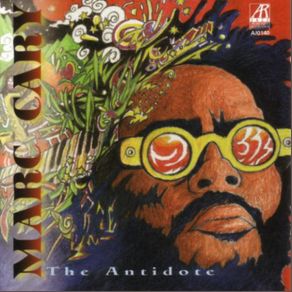The Antidote
Download links and information about The Antidote by Marc Cary. This album was released in 1998 and it belongs to Jazz genres. It contains 10 tracks with total duration of 01:02:23 minutes.

|
|
|---|---|
| Artist: | Marc Cary |
| Release date: | 1998 |
| Genre: | Jazz |
| Tracks: | 10 |
| Duration: | 01:02:23 |
| Buy it NOW at: | |
| Buy on iTunes $9.90 | |
| Buy on Amazon $8.99 | |
Tracks
[Edit]| No. | Title | Length |
|---|---|---|
| 1. | The Seven Principles / Divine Paradox | 6:45 |
| 2. | Three Wise Men | 6:16 |
| 3. | When I Think Of You | 6:57 |
| 4. | Melancholia | 6:17 |
| 5. | Gnossienne | 7:50 |
| 6. | Chappaquitic Woman | 6:55 |
| 7. | Dedicated To You | 5:26 |
| 8. | Mae'trix | 7:25 |
| 9. | The Sage | 6:54 |
| 10. | The Divine Paradox | 1:38 |
Details
[Edit]Pianist Marc Cary presents a different approach with this recording. No drummer but two percussionists, Daniel Moreno and Yarbrough Charles Laws, are holding down the rhythm. This allows the music to breathe in a unique Afro-Cuban, labyrinth dark, or more contemporized ways. Cary also plays piano solo and in duet with saxophonist Ron Blake. Bassist John Ormond is in with Blake and the percussionists for the ensemble cuts. Cary wrote six of the ten selections. Of the combo efforts, "The Seven Principles," logically in 7/4 time, breaks down a simplified Afro-Cuban repetitive riff with Blake's soprano to allow the percussionists to thrive. "Three Wise Men" features Blake's alto flying over twitching staccato bass plucks in a 6/8 caravan fashion. "The Sage" is darker, underground, and spooky, with bass-laden smoke masking giant percussion swoops, loping piano, and soprano sonically resembling an accordion — quite a startling combination of motifs. Both duets are tenor-piano: "Dedicated to You" is quite lovely, with Cary's keys singing à la Johnny Hartman and love's refrains echoed by Blake's sax. "When I Think of You" has the two even-keeled and wonderfully balanced. "The Divine Paradox" shows crystalline edges, while Cary swings Erik Satie's "Gnossienne" nicely, and interprets Duke Ellington's "Melancholia" in perfectly reflective, wistful earth tones. Perhaps the highlight is the quintet piece "Chappaquitic Woman" where a free rubato intro by Cary leads to a near hip-hop beat merged with Afro-Cuban sensibilities and multisyllabic melodious charm, truly a new music structure that borrows from many traditions. While somewhat inconsistent stylistically or programmatically, it is far from that on a pure musical level. Cary is one of the more intelligent theorists in the jazz of today, as clearly evidenced by his excellent CD Listen. He should continue to be encouraged to stretch parameters and not play it safe. This recording hints at his bold strokes. ~ Michael G. Nastos, Rovi